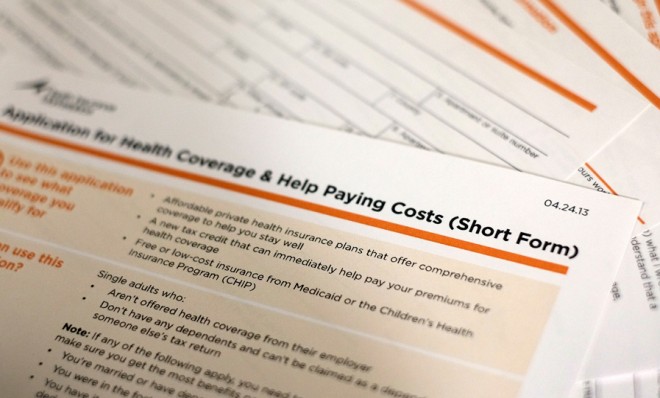The simplified ObamaCare application: Will it silence critics?
The new form is supposed to take make getting insurance coverage less of a headache


A free daily email with the biggest news stories of the day – and the best features from TheWeek.com
You are now subscribed
Your newsletter sign-up was successful
On Tuesday, the Department of Health and Human Services revealed a slimmer version of the application to request health insurance through the Affordable Care Act.
The change drops the application's length from 21 pages to three for individuals, and seven for families. The forms (and really the entire ACA) had been criticized as too complex and unwieldy, prompting the White House to make the tweak.
"We're hoping to move as many people as possible to the e-mail application form," an Obama administration official told TIME. "We received a lot of [negative] feedback from insurers and individuals like you when we published the first application forms, and we’re trying to be responsive to those concerns."
The Week
Escape your echo chamber. Get the facts behind the news, plus analysis from multiple perspectives.

Sign up for The Week's Free Newsletters
From our morning news briefing to a weekly Good News Newsletter, get the best of The Week delivered directly to your inbox.
From our morning news briefing to a weekly Good News Newsletter, get the best of The Week delivered directly to your inbox.
According to the White House, their timed tests showed people completing the streamlined form in seven minutes on average. In a press conference Tuesday, President Obama said that put the forms "well below the industry average."
The forms are used to help people determine if they're eligible to purchase private insurance through a health care exchange, an online marketplace where insurance companies will, in theory, bid against each other for potential customers. But determining eligibility is a complex process involving multiple departments of the federal government, including the IRS. As the Washington Post's Sarah Kliff notes, an entire page in the old form was used to determine if applicants were Alaska natives.
The application's length, as well as other potential speed bumps in implementing the exchanges (they're supposed to be up and running come October), have led even some Democratic lawmakers to pan them altogether. Sen. Max Baucus (D-Mont.), for one, called the rollout a "train wreck."
So how far will the change go in placating critics, if at all?
A free daily email with the biggest news stories of the day – and the best features from TheWeek.com
Families USA head Ron Pollack, a supporter of the law who had been a vocal critic of the first form, praised the new version for its simplicity.
"The revised Affordable Care Act application forms deserve applause because they will streamline the enrollment process and make it consumer-friendly," he said in a statement. "These streamlined and shortened forms significantly improve the likelihood that large numbers of people will truly get enrolled and gain access to affordable health coverage."
However, while the form is surely simpler for individuals, it may actually now be more complex for large families, says Ezra Klein at The Washington Post. The basic family form covers only two people, so families of three or more will have to make extra copies of some sections, raising the final page count.
"So the new form really is less intimidating for single adults, who now get an application catering to them," Klein says. "But it's a bigger pain in the neck for a family of four, who now get an application catering to families of two — and to a media that equates fewer pages with better forms and laws. As larger families will now find out, shorter and simpler are not actually synonyms."
Still, TIME's Joe Klein, who'd previously warned that "ObamaCare will fail if [Obama] doesn’t start paying more attention to the details of implementation," says the change is a welcome one, because it shows the White House is at least open to tinkering with the program to make it better serve consumers.
There are more than a few other concerns and ways the system might be improved that I've written about in the past. The good news about the streamlined application, though, is that it shows the Administration is alert and flexible and responsive — and, if we’re lucky, may turn out to be innovative in enacting a system that will bring health care to those who haven't had it before, and lower costs to the self-employed masses who've had to go out and buy insurance on their own. [TIME]
The White House will likely make more changes to the insurance exchange aspect of the ACA going forward. Obama himself said as much Tuesday, acknowledging, "Even if we do everything perfectly, there'll still be, you know, glitches and bumps."
Jon Terbush is an associate editor at TheWeek.com covering politics, sports, and other things he finds interesting. He has previously written for Talking Points Memo, Raw Story, and Business Insider.
